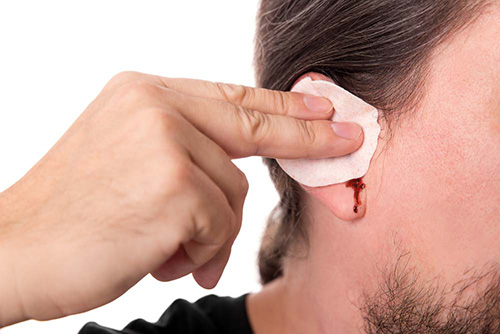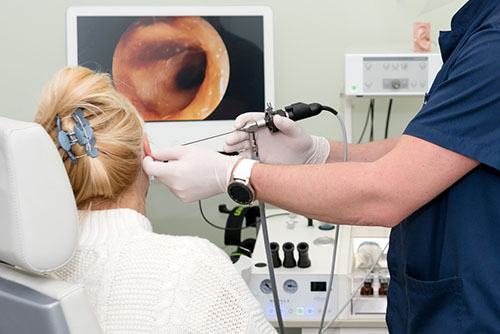Blood coming from the ear

- What to do if there is blood coming from the ear?
- Causes of blood coming from the ear ?
- How is ear bleeding treated ?
Our ears are one of our most important sensory organs that fulfill the function of hearing. In addition to hearing, which is widely known for its importance and function, it is one of the balance centers of our body. Its location close to the brain, being delicate and sensitive in terms of its structure, can cause it to be affected rapidly due to the strain of our body for various reasons. Blood coming from the ear is not a normal condition. It is a sign of another problem that causes blood to come out.
In case of blood coming from the ear, it is absolutely necessary to go to a specialist as soon as possible and, if accessible, to an organized hospital. Ear bleeding should be taken seriously and no external intervention should be used to stop the blood.
What to do if there is blood coming from the ear?
Bleeding from the ear is a symptom of other diseases, which can be caused by problems originating in the middle or inner ear or by very serious chronic health problems. In case of ear bleeding, it is important not to insert drops, cotton wool or similar foreign objects into the ear. Until the cause of the bleeding is determined, such interventions may constitute an incorrect treatment and in some cases may cause effects up to the loss of the ability to hear.Cotton or gauze should be used to prevent the spread of bleeding, not to stop it, and the head should be tilted slightly in the direction of the ear where the bleeding occurs. At this time, it is important to apply to the nearest health institution. Intense bleeding can cause blood pressure drop due to blood loss and various other dangerous consequences. For this reason, you should definitely go to a health institution quickly.
Causes of blood coming from the ear ?

There is a wide range of causes of blood coming from the ear. The most common causes of bleeding are inflammation in the inner or middle ear, pimple eruption, middle ear perforation, various damage to the inner or middle ear as a result of trauma, trauma due to insertion of cotton wool or foreign objects into the ear.
It is inevitable that the body is strained during high fever and prolonged illnesses, sometimes due to the various antibiotics used for these diseases. In addition to such strains, overloading our body due to intense stress and fatigue can cause pimples and inflammation in our sensitive ears. In such cases, there are also preliminary symptoms such as tinnitus and pain. Bleeding or pus discharge may occur due to the bursting of the inflammation or pimple.
Among the reasons for blood coming from the ear, it is also possible for foreign substances to enter the ear, cause inflammation, insect ingress, water ingress and related inflammation. Some fungal diseases can also cause ear bleeding. In addition, ear bleeding can also occur as a symptom of some serious and chronic health problems. For example, some brain tumors can cause bleeding from the ear. Even if ear bleeding occurs for the mildest reason, it should be taken seriously and a specialist should be consulted immediately after the bleeding starts.
How is ear bleeding treated ?

In case of blood coming from the ear, a specialist should be consulted quickly and the cause of the bleeding should be determined. During the diagnostic phase, your specialist will perform a number of procedures and take a detailed history of how the bleeding started. Providing accurate information is very important for the diagnostic phase. After this stage, the correct treatment is necessary to stop the bleeding and prevent its recurrence.
Ear bleeding can occur in the form of a small amount of blood loss or intense blood loss. In both cases, it would be appropriate to consult a health institution as soon as possible. Underestimating a small amount of blood does not mean that the cause is not a serious problem. Bleeding that recurs over time and gradually increases or continues little by little may indicate other underlying health problems. In order to treat ear bleeding, the cause must first be identified, i.e. diagnosed. After the diagnosis is made, various treatment methods such as medication, ear washing and surgical interventions can be used.
Our ears are balance centers
In addition to their hearing function, our ears are the balance centers of our body. With this function, they react most rapidly to any change in our body. Some negative health problems in our ears also cause disruptions in the balance center. This has rapid consequences, such as affecting blood pressure and blood sugar. The effects of bleeding problems on our balance center can be rapid and shocking to our body.There are no comments yet. Would you like to add a comment?
In accordance with Article 10 of the Personal Data Protection Law (PDPL,KVKK) titled Data Controller's Obligation to Disclose, we use cookies in accordance with the legislation, limited to the purposes specified in the privacy policy.

